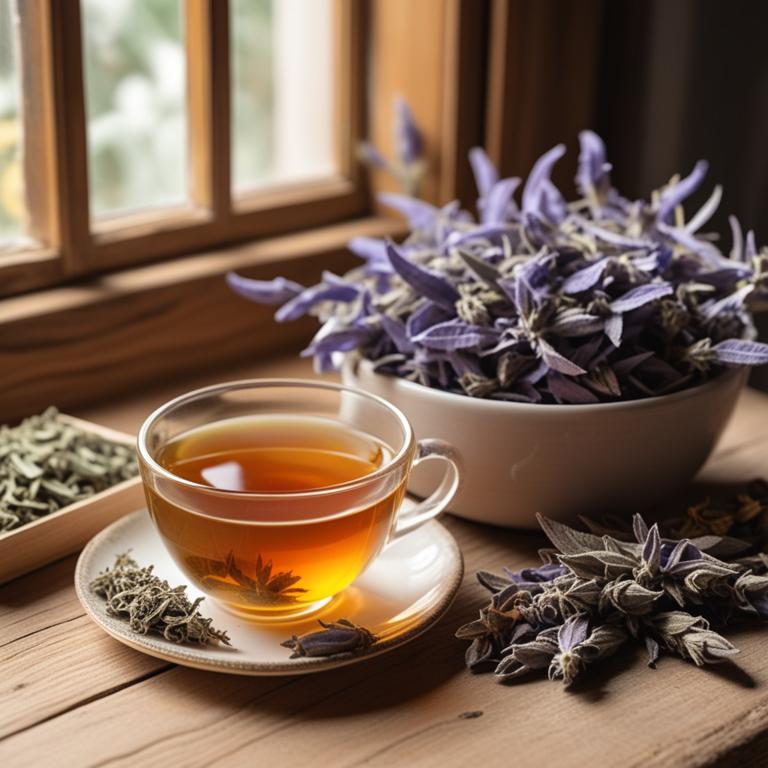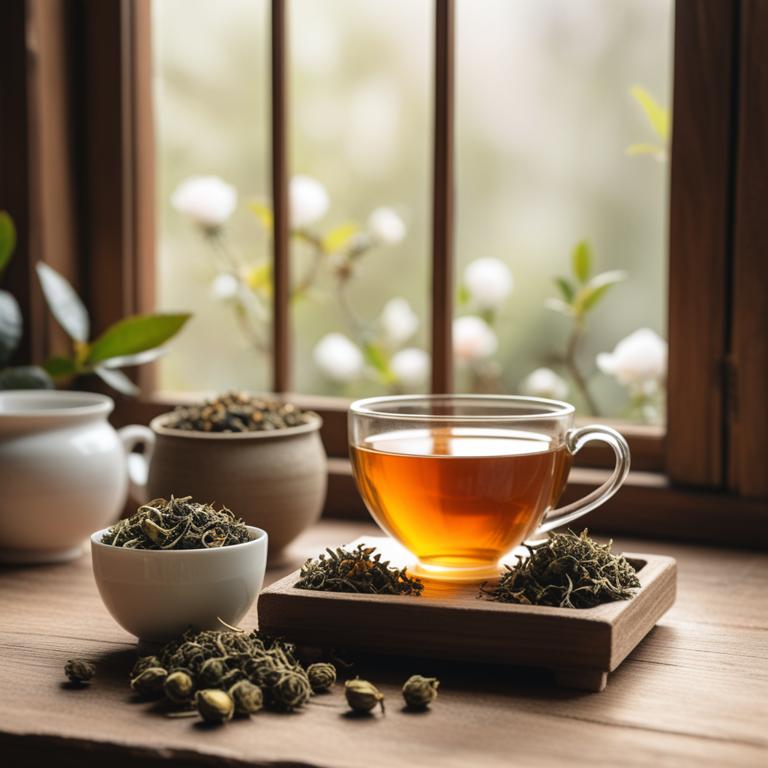11 Best Herbal Teas For Feverish Feeling

Herbal teas for Feverish feeling are a natural remedy used to alleviate symptoms of fever, chills, and body aches caused by viral infections, such as the common cold or flu.
These teas are rich in antioxidants, vitamins, and minerals that help to boost the immune system, reduce inflammation, and promote relaxation, making them an effective treatment for this ailment.
Some examples of herbal teas that can be used to treat feverish feeling include peppermint, which helps to cool the body and ease headaches, ginger, which has anti-inflammatory properties that reduce nausea and body aches, chamomile, which promotes relaxation and calms the mind, and elderberry, which is rich in vitamins and minerals that help to boost the immune system and reduce the severity of symptoms.
Other herbal teas that can be used to treat feverish feeling include lavender, lemon balm, echinacea, and yarrow, all of which have unique properties that help to alleviate symptoms and promote overall well-being.
According to "Journal of alternative and complementary medicine (New York, N.Y.)", teas for feverish feeling may be effectively relieved by consuming Echinacea Plus tea, which was shown to reduce the duration of symptoms in a study involving 95 subjects with cold or flu symptoms.
Below there's a list of the 11 best herbal teas for feverish feeling.
- 1. Eucalyptus globulus teas
- 2. Zingiber officinale teas
- 3. Cinchona officinalis teas
- 4. Echinacea purpurea teas
- 5. Melissa officinalis teas
- 6. Lavandula angustifolia teas
- 7. Curcuma longa teas
- 8. Sambucus nigra teas
- 9. Thymus vulgaris teas
- 10. Salvia officinalis teas
- 11. Camellia sinensis teas
Also you may be interested in...
TODAY'S FREE BOUNDLE
Herb Drying Checklist + Herbal Tea Shopping List + Medicinal Herbs Flashcards
Enter you best email address below to receive this bundle (3 product valued $19.95) for FREE + exclusive access to The Aphotecary Letter.
$19.95 -> $0.00
1. Eucalyptus globulus teas

Eucalyptus globulus teas have been traditionally used to treat feverish feelings, which is often associated with the common cold and flu.
The antipyretic properties of Eucalyptus globulus teas help to reduce body temperature and alleviate the discomfort associated with fever, providing relief from symptoms such as headaches and fatigue.
The bioactive constituents of Eucalyptus globulus teas, including eucalyptol, limonene, and alpha-pinene, have been found to possess anti-inflammatory and antimicrobial properties that contribute to its therapeutic effects.
By consuming Eucalyptus globulus teas, individuals can benefit from its expectorant and decongestant properties, which help to clear mucus and ease respiratory issues, ultimately promoting overall well-being and recovery from illness.
Related Study
According to "Evidence-based complementary and alternative medicine: eCAM", Eucalyptus globulus teas for feverish feeling may be beneficial as it was documented as one of the top-cited plant species used in the treatment of respiratory tract infections in Ethiopia, where feverish feeling is often associated with these infections.
2. Zingiber officinale teas

Zingiber officinale teas, commonly known as ginger tea, have been used for centuries to treat the feverish feeling ailment, also known as flu or common cold.
The properties of this herbal preparation help to treat this ailment by reducing inflammation, relieving nausea, and warming the body to promote sweating, which aids in the removal of toxins.
The bioactive constituents of ginger tea, including gingerols and shogaols, have anti-inflammatory and antioxidant properties that help to reduce fever and alleviate symptoms.
The benefits of using ginger tea to treat this ailment include rapid relief from symptoms, improved digestion, and boosted immune system function.
Related Study
According to "Journal of ethnopharmacology", Zingiber officinale teas for feverish feeling may be effective in reducing fever due to the extract's ability to reduce yeast-induced fever in rats.
3. Cinchona officinalis teas

Cinchona officinalis teas have been traditionally used to treat the feverish feeling ailment, also known as malaria, due to their antipyretic and anti-inflammatory properties.
The quinine content in Cinchona officinalis teas helps to reduce fever by inhibiting the production of prostaglandins, which are responsible for inducing fever.
The bioactive constituents, including quinine, cinchonine, and cinchonidine, have been shown to exhibit antimalarial activity by targeting the malaria parasite and preventing it from multiplying.
The benefits of using Cinchona officinalis teas to treat malaria include reduced symptoms, improved quality of life, and the prevention of further complications associated with the disease.
4. Echinacea purpurea teas

Echinacea purpurea teas have been traditionally used to treat feverish feelings, particularly during the onset of the common cold and flu.
The anti-inflammatory and immunomodulatory properties of this herbal preparation help to reduce inflammation, soothe the body, and alleviate symptoms such as fever, cough, and sore throat.
The bioactive constituents, including alkylamides, glycosides, and phenolic acids, play a crucial role in modulating the immune system, reducing oxidative stress, and fighting off infections.
By promoting immune function and reducing inflammation, Echinacea purpurea teas can help to alleviate feverish feelings, promote overall well-being, and support the body's natural defense mechanisms.
Related Study
According to "The Cochrane database of systematic reviews", Echinacea purpurea teas for feverish feeling may be beneficial when compared to a placebo, although there is not enough evidence to recommend a specific product.
5. Melissa officinalis teas

Melissa officinalis teas have been traditionally used to treat feverish feelings and alleviate symptoms associated with colds and flu.
The properties of Melissa officinalis teas that help to treat this ailment include its anti-inflammatory, antiviral, and antimicrobial properties, which work together to soothe the body and reduce the severity of symptoms.
The bioactive constituents of Melissa officinalis teas, such as rosmarinic acid, flavonoids, and terpenoids, help to treat feverish feelings by modulating the immune system, reducing inflammation, and fighting off viral and bacterial infections.
The benefits of using Melissa officinalis teas to treat feverish feelings include relief from headaches, sore throats, and fatigue, as well as a general sense of well-being and relaxation.
6. Lavandula angustifolia teas

Lavandula angustifolia teas have been traditionally used to treat feverish feelings and alleviate symptoms associated with colds and flu.
The anti-inflammatory and antispasmodic properties of this herbal preparation help to soothe and calm the body, reducing the discomfort and fatigue associated with fever.
The bioactive constituents, including linalool and linalyl acetate, exhibit antimicrobial and antioxidant activities that aid in the treatment of feverish feelings by promoting relaxation and reducing inflammation.
The benefits of consuming Lavandula angustifolia teas include improved sleep quality, reduced stress and anxiety, and a sense of overall well-being, making it a popular natural remedy for treating feverish feelings.
7. Curcuma longa teas

Curcuma longa teas, a traditional herbal remedy, have been used to treat feverish feelings due to their anti-inflammatory and antioxidant properties.
The bioactive constituents, including curcumin, demethoxycurcumin, and bisdemethoxycurcumin, help to reduce inflammation and alleviate symptoms associated with fever.
By modulating the body's response to fever and reducing the production of pro-inflammatory cytokines, Curcuma longa teas help to alleviate discomfort and promote a sense of well-being.
The benefits of using Curcuma longa teas for feverish feelings include their ability to reduce the severity and duration of symptoms, promoting a faster recovery and improved overall health.
Related Study
According to "International journal for vitamin and nutrition research. Internationale Zeitschrift fur Vitamin- und Ernahrungsforschung. Journal international de vitaminologie et de nutrition", Curcuma longa teas may be beneficial in reducing feverish feeling due to their anti-inflammatory effects, which were shown to decrease tracheal responsiveness and lung pathological features in ovalbumin-sensitized rats.
8. Sambucus nigra teas

Sambucus nigra teas have been traditionally used to treat feverish feelings, such as those experienced during colds and flu, due to their anti-inflammatory and antiviral properties.
The bioactive constituents, including flavonoids, phenolic acids, and terpenes, in these teas help to reduce the severity of fever and alleviate symptoms associated with upper respiratory tract infections.
By acting as a natural antipyretic, Sambucus nigra teas help to regulate body temperature and promote a sense of well-being, making them a popular herbal remedy for treating feverish feelings.
The benefits of using Sambucus nigra teas include a reduction in the duration and severity of illness, as well as a boost to the immune system, making them an effective and natural way to combat feverish feelings.
9. Thymus vulgaris teas

Thymus vulgaris teas, also known as thyme tea, have been traditionally used to treat feverish feelings due to their antipyretic and anti-inflammatory properties.
The bioactive constituents of thyme tea, including thymol and carvacrol, help to reduce fever and alleviate symptoms associated with this ailment by inhibiting the production of pro-inflammatory cytokines and inducing heat loss.
The benefits of thyme tea in treating feverish feelings include its ability to soothe and calm the body, reduce body temperature, and promote overall well-being.
Regular consumption of thyme tea has been shown to be an effective and natural remedy for managing feverish feelings, making it a popular choice for those seeking a holistic approach to health.
Related Study
According to the study, Thymus vulgaris teas for feverish feeling may be beneficial due to its anti-inflammatory effects, which can help to modulate the production of pro-inflammatory cytokines such as IFN-γ and IL-6, and increase the production of anti-inflammatory cytokines like IL-10 and TGF-β.
10. Salvia officinalis teas

Salvia officinalis teas have been traditionally used to treat the feverish feeling ailment, often referred to as the flu or a cold, due to their antipyretic, anti-inflammatory, and antimicrobial properties.
The bioactive constituents of Salvia officinalis, including flavonoids, phenolic acids, and rosmarinic acid, help to reduce fever, alleviate congestion, and soothe the respiratory tract, thereby alleviating the symptoms of the feverish feeling ailment.
By drinking Salvia officinalis teas, individuals can benefit from the anti-inflammatory effects of salvinic acid, which helps to reduce inflammation and alleviate body aches, as well as the antimicrobial properties of carnosic acid, which helps to combat infections.
Overall, Salvia officinalis teas provide a natural and effective way to treat the feverish feeling ailment, promoting a swift recovery and alleviating discomfort.
Related Study
According to "European journal of medical research", Salvia officinalis teas for feverish feeling associated with throat pain caused by acute viral pharyngitis provide a convenient and safe treatment, with symptomatic relief occurring within the first two hours after administration and being statistically significantly superior to placebo.
11. Camellia sinensis teas

Camellia sinensis teas, also known as green tea, have been traditionally used to treat feverish feelings due to their anti-inflammatory and antioxidant properties.
The bioactive constituents present in green tea, such as catechins and theaflavins, help to reduce inflammation and fever by blocking the production of pro-inflammatory enzymes.
These constituents also have antimicrobial properties, which aid in fighting off infections that may be causing the fever.
The benefits of using Camellia sinensis teas to treat feverish feelings include reducing body temperature, alleviating symptoms such as headaches and fatigue, and promoting overall well-being.